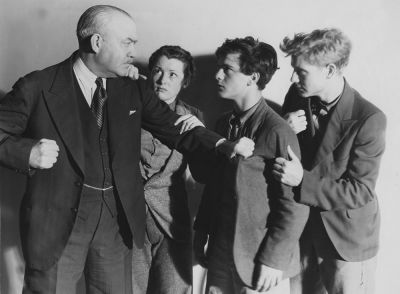
WILD BOYS OF THE ROAD
(USA/1933) R.: William Wellman. D.: 68'. V. inglese
Sog.: Daniel Ahearn. Scen.: Earl Baldwin. F.: Arthur L. Todd. M.: Thomas Pratt. Scgf.: Esdras Hartley. Int.: Frankie Darro (Eddie), Edwin Phillips (Tommy), Dorothy Coonan (Sally), Grant Mitchell (Mr. Smith), Rochelle Hudson (Grace), Sterling Holloway (Ollie), Ward Bond (Red), Minna Gombell (zia Carrie), Claire McDowell (Mrs. Smith), Ann Hovey (Lola), Charles Grapewin (Mr. Cadmust), Robert Barrat (giudice White). Prod.: First National Pictures
35mm. D.: 68'. Versione inglese / English version
Da: Library of Congress per concessione di Park Circus
Nel novembre del 2011, quando la polizia di New York ha sgomberato con la forza Zuccotti Park, simbolo delle proteste di Occupy Wall Street, mi sono tornate in mente le immagini di questo film del 1933 in cui i giovani disoccupati vengono ripetutamente e violentemente cacciati dai vagoni merci e dalle baracche in cui hanno trovato riparo. Ma anziché opporsi al capitalismo e lottare per i diritti del '99 per cento', i ragazzi e la ragazza selvaggi di Wellman (lei è la sua futura moglie, Dorothy Coonan) si accontentano di sopravvivere, di trovare un lavoro e di aiutare le famiglie in difficoltà che si sono lasciati alle spalle. Sono intrappolati nel mondo fin troppo reale della Grande Depressione, mondo che Wellman si impegna a descrivere nel modo più accurato possibile. Come commenterà Bertrand Tavernier, "I film sociali di Wellman sono tra i più radicali e violenti del genere. Hal Wallis fece tagliare molte scene di Wild Boys of the Road che giudicava insopportabili per il pubblico e che per Wellman esprimevano la realtà della Depressione". Al film fu anche affibbiato un inevitabile e artificioso lieto fine. Nonostante le imposizioni, Wild Boys of the Road spicca tra i film dell'epoca per la felice contrapposizione tra la dura realtà del tempo e la gioiosa innocenza della giovinezza. Eddie, Tommy e Sally illuminano uno schermo costantemente minacciato dall'oscurità. Ne è un perfetto esempio la scena in cui Eddie vende la sua amatissima auto per aiutare il padre disoccupato. Dopo aver consegnato al padre i ventidue dollari frutto di disperate contrattazioni, il ragazzo esce di casa e vede il garage vuoto e abbandonato. Dopo una breve pausa si allontana fischiettando le note di We're in the Money, la canzone resa famosa da La danza delle luci (in cui Wellman, tra l'altro, vide per la prima volta Dorothy Coonan). Il motivetto sfuma, la realtà riprende il sopravvento e il ragazzo torna rabbiosamente sui suoi passi e chiude la porta delgarage. È una scena malinconica, malgrado l'intervallo sognante alla Busby Berkeley, e riporta alla mente una delle tante osservazioni di Manny Farber sul regista: "Wellman è il più interessante di tutti questi poeti degli spazi, soprattutto per gli scenari alla Hopper. Sa dipingere con lievi e furiosi colpi di pennello facciate di negozi, tetre camere da letto, la rapina in un distributore di benzina isolato. E mescolare i soprassalti di volgarità [...] con una danza della composizione spaziale in cui la scena sembra costruirsi davanti agli occhi dello spettatore".
Gina Telaroli
In November 2011, when news broke of Occupy Wall Street's forced and violent removal from Zuccotti Park at the hands of the NYPD and the hoses they held, images of Wellman's 1933 film of unemployable youth living in boxcars and shantytowns and repeatedly being violently ejected from them immediately sprang to mind. But instead of making a statement against capitalism and the 99 percent, Wellman's wild boys and girl (his future wife Dorothy Coonan) are just aiming to survive while looking for jobs and a way to help the struggling families they left behind. They're caught in the very real world of the Great Depression, a world Wellman went to great lengths to capture accurately, as Bertrand Tavernier documents: "Wellman's social-problem films are among the genre's most radical and violent. Hal Wallis had several shots deleted from Wild Boys of the Road because he deemed them unbearable for the general public; to Wellman they expressed the realities of the Depression". The movie also got saddled with a required and very-much-tacked-on happy ending. Even with its imposed outlook, Wild Boys of the Road stands out amongst films of the era, as it creates a striking juxtaposition between the harsh reality of the time period and the innocence and joy of youth. Tommy and Sally light up a screen that keeps threatening to go dark. This is perfectly encapsulated in the scene where Eddie sells his beloved car in order to get money for his unemployed father. After giving his father the twenty-two American dollars he desperately haggled for, he steps outside and is confronted with the now empty and abandoned garage. He pauses for a moment, walks away from the garage, and begins to whistle a few bars of We're in the Money, made popular earlier that year by Gold Diggers of 1933 (the film that coincidentally introduced Wellman to Coonan). The tune slowly tapers off as reality sets in, and he suddenly, and fiercely, turns around and runs to shut the garage door. It's a somber scene, despite the burst of Busby Berkeley dreams, and beautifully brings to mind some of Manny Farber's many words on Well-man: "Of all these poet-builders Wellman is the most interesting, particularly with Hopper-type scenery. It is a matter of drawing store fronts, heavy bedroom boudoirs, the heisting of a lonely service station, with light furious strokes. Also, in mixing jolting vulgarity [...] with a space composition dance in which the scene seems to be constructed before your eyes".
Gina Telaroli

Tariffe:
Aria condizionata
Info: 051224605











